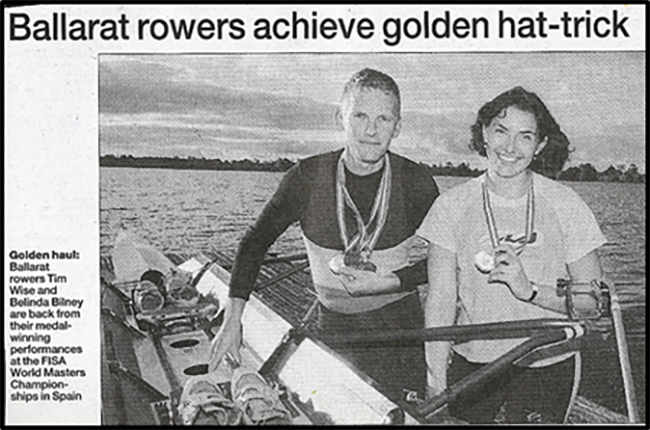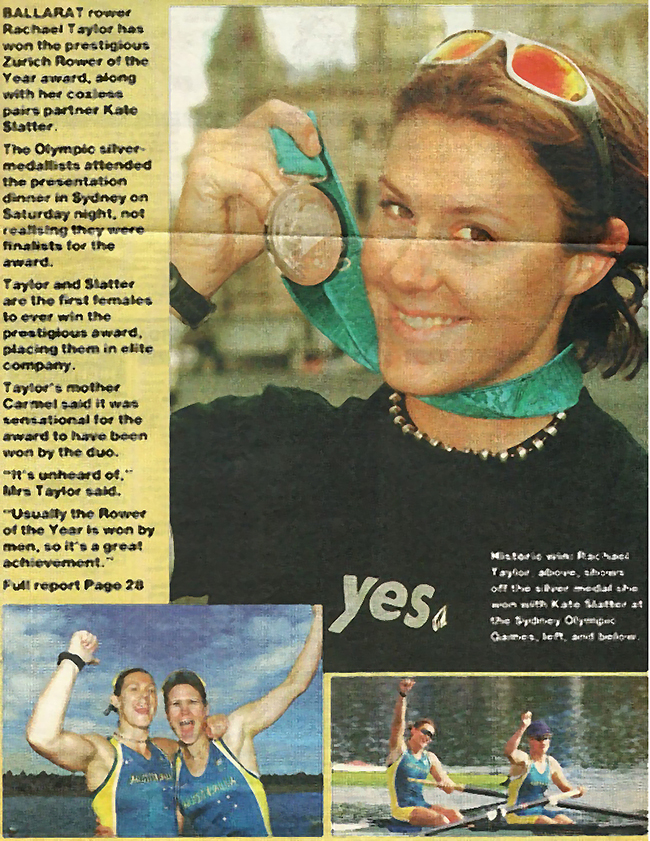History of Begonia City Ladies Rowing Club
- Introduction
- Background
- After amalgamation
- Brief chronology
- 1971 - The catalyst
- 1972 - Own regatta
- 1973 - Closer ties with Ballarat City RC
- 1974 - Settling down
- 1975 - New members and uniforms
- 1976 - Senior B racing and coaching
- 1977 - Senior A racing and championships
- 1978 - Full amalgamation with Ballarat City RC
- 1979 - First season as Ballarat City RC
- 1980’s - Onward and Upward
- Appendix
After Amalgamation in 1979 and beyond
By the 1980’s the women’s rowing in Ballarat was finally becoming more accessible to a wide range of women. The Begonia City Ladies had amalgamated with their host club and become Ballarat City Ladies. With nearly a decade of rowing under their belts, they were going from strength to strength. Wendouree Ballarat Rowing Club also now had women’s crews training and competing. In the Head of the Lake regatta by 1982, there were races for Girl’s second and third crews and by 1985 racing for fourth crews was added. 1988 saw a race for fifth crews added and then by 1990 the girls were almost on a par with the boys with 7 races for girls and 10 for boys. On the world stage, it wasn’t until 1980 that women took their place in Olympic rowing and World Championships.
1985 saw the inaugural Head of the Schoolgirls Regatta held in Victoria, which was held for the first two years on Lake Wendouree. The winner of the inaugural Youth sculls was Sonya Adrians representing Ballarat High School. Sonya trained and raced from Ballarat City Rowing Club with coach Danny Elliott and was the first schoolgirl sculler to represent both Ballarat High School and Ballarat at state and National level. The Head of the School Girls regatta was also held on the Lake in 1986 and Sonya again won. However Lake Wendouree producing extremely windy and rough both years, the conditions on the Lake proved to be too challenging for the schoolgirls, and the competition moved to the Barwon River.
The 1980’s also saw Ballarat City Rowing Club Ladies winning Victorian Championships, Victorian representation at the Interstate Regatta and Victorian Rowing Association Premierships for the most successful club. They dominated sculling events in Victoria from novice through to Senior. The 1990’s saw even greater gains with members or former members gaining selection on Australian teams. In less than a decade from the first tentative steps to form a club to when women claimed their place on the water, they proved not only did they have the right to be there but they could be as successful in the boat as the men. The founding women could never have imagined what the formation of the club would lead too and how many women would take up an oar with great enjoyment and success.
In 1991 the Ballarat City Rowing Club hosted the first regional Talent Identification Program in Victoria. This introduced a new wave of young women to the club. Kate and Danny Elliott took on the coaching load and Warren Payne from the University of Ballarat assisted with the sports science. Eight boys and girls who had never rowed before were introduced to the sport and were very successful. The girls’ squad in particular were undefeated at regattas in their first season and winning several state championships. One graduate of this program was Rachel Taylor who would go on to row with great success at national and international level.

In 1992 Kate (Wise) Elliott received a Prime Minister’s award for Women in Sport for her support and encouragement of women in rowing, particularly her work with the girls in the Talent Identification Squad.
In the latter half of the 1990’s Ballarat City saw the rise in the popularity of master’s rowing. The club’s first female Master of note, who represented the club on the world stage at FISA Masters World Championships was Belinda Bilney racing in a mixed double scull with partner Tim Wise. Belinda Bilney was at the forefront of this women’s Masters revival. She competed at Australian Masters Championships with great success and FISA World Masters Championships in Canada, Spain, Australia and Belgium winning multiple gold medals at every competition. Belinda is the first and only female Ballarat rower to win multiple gold medals at FISA Master’s World Championships. Having joined Ballarat City Rowing Club in 1985 from Ballarat High School, she was in the small group of women that joined the club in the 80’s and continued to build on the foundations laid by Begonia City Ladies.


Article from the Ballarat Courier, October 21st 1999, Belinda Bilney and Tim Wise winning gold medals in the Mixed A double scull at three consecutive FISA Masters World Championships. Belinda is the only woman rower from Ballarat to win gold medals at Masters World Championships level
In 2000 at the Sydney Olympic Games, Rachel Taylor, who learned to row at Ballarat City Rowing Club as a sixteen year old as a member of the Talent Identification Program for two years, won an Olympic silver medal. She was coached from beginner to AIS scholarship recipient by Kate (Wise) Elliott and so forging a link back to the original Begonia City Ladies club.
In just 30 years, women’s rowing in Ballarat had gone from its first tentative start to international success with each generation of women building on the experience and success of the previous one. And at the catalyst for this process was the formation of the Begonia City Ladies Rowing Club.

Article from the Ballarat Courier reporting on Rachel and pairs partner Kate Slatter winning the Zurich Rower of the Year Award for their Olympic silver medal win.
Success in women’s rowing continued in the 2000’s when it was the time of the Masters rowers. Women who had previously rowed at the club, or at school when they were younger, found a new lease of life in Master’s rowing and came and competed for the club in 2002 when in November, Ballarat hosted the rowing competition for the World Masters Games. Many women who did not have the opportunity to row in the 70’s and 80’s took the opportunity to try the sport. Kate (Wise) Elliott joined accomplished Master’s rower Belinda Bilney competing at this event. For Kate it was first race for seven years and it was twenty two years since she had first competed for Begonia City.
From 2005 to 2012 the unthinkable happened and Lake Wendouree dried up completely in the millennium drought. During this time no new members joined the clubs. Schoolgirl rowing continued at Nagambie and on the Barwon River. By the time the drought was over all rowers had to begin again including the women. 2014 saw an influx of new members and they began to write a new chapter in women’s rowing.
As the Head Coach from the Romanian women’s team once remarked: “Rowing is a sport for women that men can also do.”
The women and girls of Ballarat have certainly proved that to be true ,as they trained and raced alongside the men for over the fifty years.

